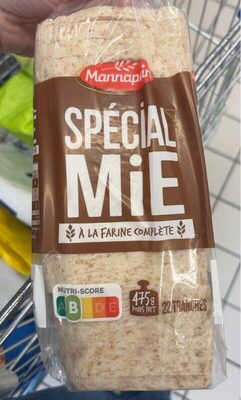
Barcode: 26025094
Pain de mie farine complète sans croute
DOUBTFUL
📝 Reason: Certain components in this product have ambiguous Islamic rulings. Consultation with a qualified Halal certification authority is strongly recommended before consumption.
🏷️ Category: Plant Based Foods And Beverages, Plant Based Foods, Cereals And Potatoes, Breads, Sliced Breads, Sliced Breads Without Crust
📄 Certificates: Nutriscore, Nutriscore Grade B
Ingredients:
Details
Exploring the Halal Status of Pain de mie farine complète sans croute
When considering dietary choices, understanding the halal status of products is essential for many consumers. In this article, we will delve into the specifics of the product Pain de mie farine complète sans croute and its ingredients to help you understand its halal status.
Halal Status Overview
The halal status of Pain de mie farine complète sans croute is currently classified as doubtful. Certain components in this product carry ambiguous Islamic rulings. Hence, it is highly recommended to consult with a qualified Halal certification authority before deciding to consume it.
Understanding the Ingredients
The ingredients list of the Pain de mie includes:
- Whole wheat flour (37%)
- Wheat flour (28.5%)
- Water
- Sugar
- Rapeseed oil
- Wheat gluten
- Yeast
- Salt
- Emulsifiers
- Preservative: calcium propionate
- Thickener: xanthan gum
- Flour treatment agent: ascorbic acid
Ingredient Break Down
Let’s break down these ingredients to clarify their halal status:
1. Whole Wheat Flour (37%)
This ingredient is permissible in Islam and is a staple in many halal diets.
2. Wheat Flour (28.5%)
Similar to whole wheat flour, standard wheat flour is also halal.
3. Water
Water, being a natural substance, is universally accepted as halal.
4. Sugar
Sugar is considered halal unless it has an additive that is not permissible.
5. Rapeseed Oil
Rapeseed oil is permissible in Islam and is often used in baking and cooking.
6. Wheat Gluten
This ingredient is also halal as it is derived from wheat.
7. Yeast
Yeast, used in fermentation, is halal and common in bread-making.
8. Salt
Salt, a natural mineral, holds a halal status.
9. Emulsifiers
The emulsifiers used include:
- Mono- and diglycerides of fatty acids (from rapeseed and sunflower) – these are generally considered halal.
10. Monoacetyl Tartaric Acid and Diacetyl Tartaric Acid Esters
This emulsifier (E334) has a doubtful status and may not be acceptable in all interpretations of halal guidelines.
11. Lecithins (Rapeseed)
Lecithins derived from rapeseed are generally considered halal.
12. Preservative: Calcium Propionate (E282)
This preservative is acceptable and used widely in baking. Its halal status is recognized.
13. Thickener: Xanthan Gum
Xanthan gum is plant-based and widely accepted in halal dietary guidelines.
14. Flour Treatment Agent: Ascorbic Acid
Ascorbic acid is also permissible in Islam and serves as a milling agent.
Brand and Certification
While the Pain de mie is categorized under Plant Based Foods And Beverages, it lacks a definitive Halal certification. It does possess a Nutriscore rating of ‘B’, indicating a favorable nutritional profile. However, without a clear certification of halal compliance, consumers must approach this product with caution.
Final Thoughts
In conclusion, the Pain de mie farine complète sans croute has ingredients that are primarily permissible in Islam, but due to some questionable emulsifiers, its overall halal status remains doubtful. We advise consulting your local Halal authority for personalized guidance. Always prioritize your dietary needs and the integrity of your halal compliance.
